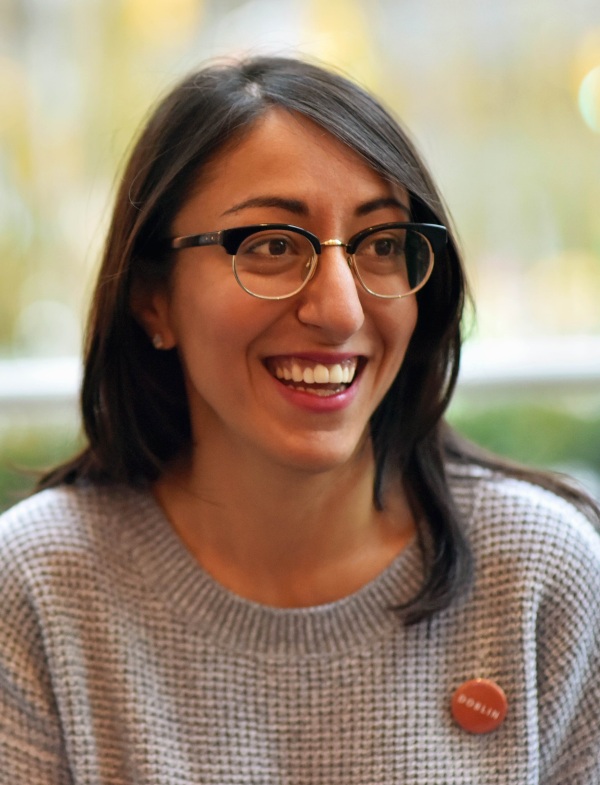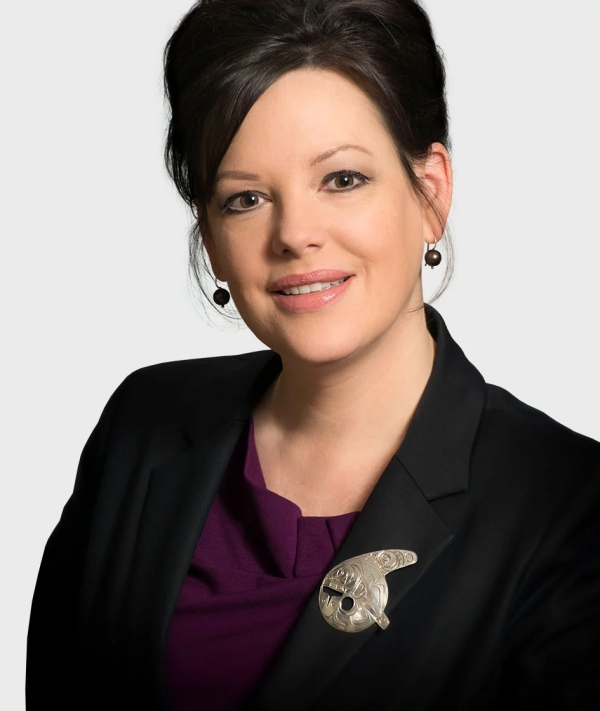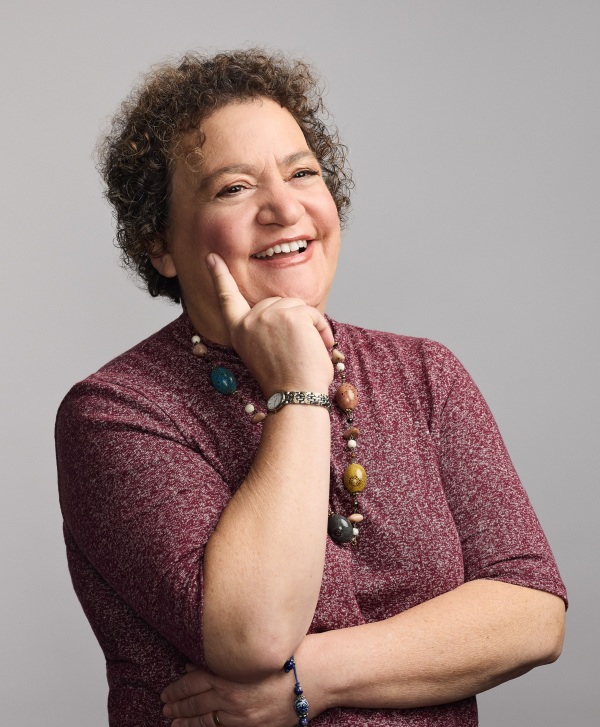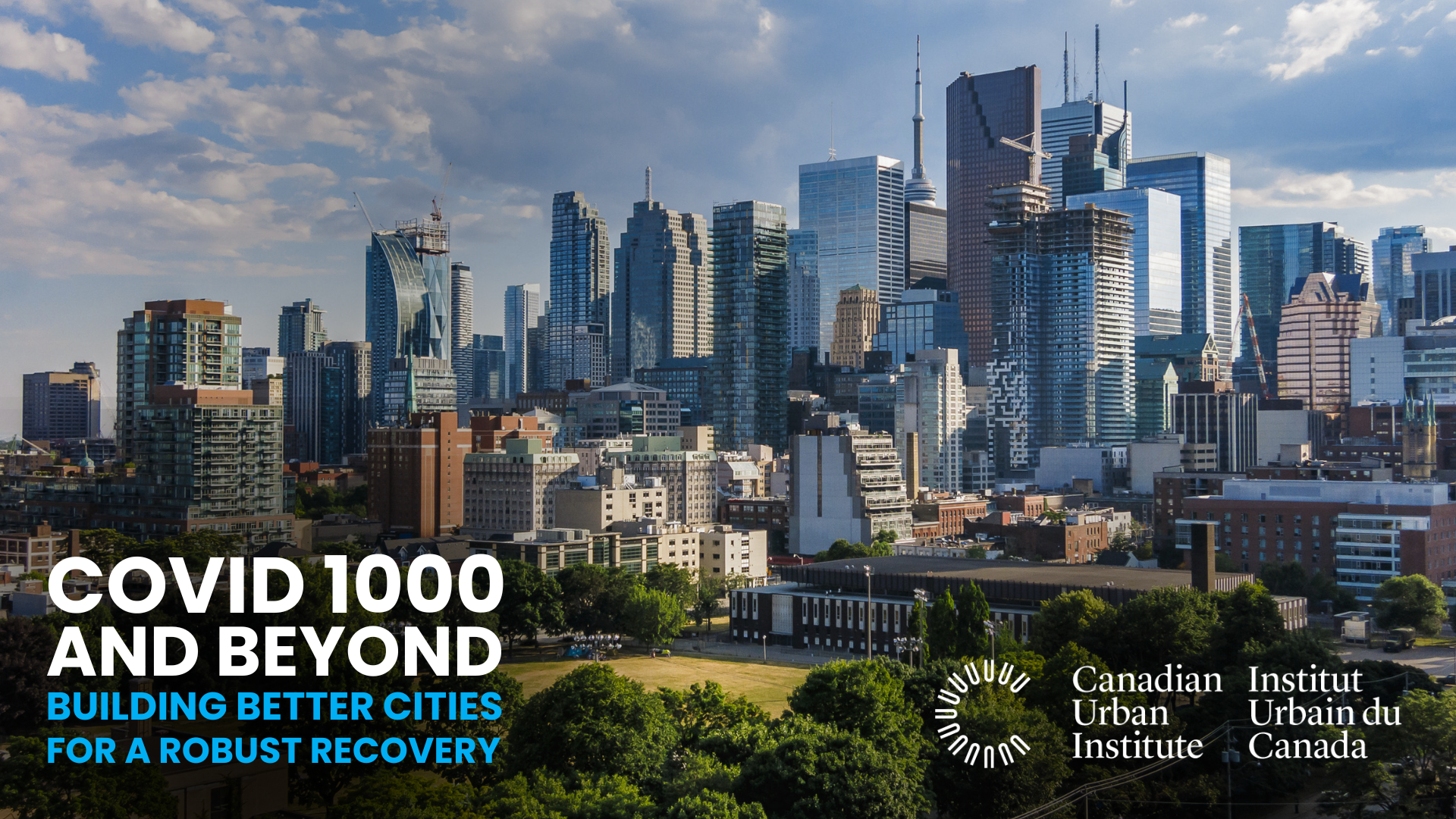Featured Guests
You’ll find this guest among our growing roll of Urban Champions.
-

Zahra Ebrahim
CEO, Monumental
-

Jennifer Moore Rattray
Chief Operating Officer, Southern Chiefs’ Organization
-

Jean-Noé Landry
Volunteer Governance Specialist, Solon
-

Carolyn Whitzman
Professor, University of Ottawa
Key Takeaways
A roundup of the most compelling ideas, themes and quotes from this candid conversation
1. Data is critical to decision-making and needs to be communicated and accessible to a broad audience.
Data and information were used not only for public health decisions but also for individuals to be able to make their own informed decisions about risk and safety during COVID. As such, there was a necessity to increase data literacy and communicate data in a manner that was understandable to a wide audience. The crisis created by COVID also meant that intersectoral collaboration around data and information was absolutely necessary. This same strategy around providing data quickly, collaboratively and accessibly applies to many other issues such as climate change.
2. Funding programs implemented during a period of crisis addressed underlying issues that existed pre-COVID.
We saw the impact of direct funding to households through federal programs like CERB. This increased the income of the most vulnerable households and lifted approximately ¼ million people out of core housing need. Now that CERB has ended we are seeing the results of that lack of income support with increasing numbers of individuals and households falling into housing insecurity and homelessness. Second, COVID revealed the impacts of overcrowded housing (especially in shelters and long-term care facilities) where COVID deaths were far more significant. We saw first-hand how access to adequate housing and basic income was critical to supporting the most vulnerable and, in some cases, led to life or death outcomes.
3. Local leadership provided on-the-ground action to support communities in nimble ways.
There is evidence that local leadership is able to respond to community need quickly and appropriately. In the case of Indigenous communities, this meant using data to make the case for a targeted vaccine rollout for Indigenous communities based on the disproportionate impact of COVID to Indigenous communities. It also resulted in getting access to rapid tests, masks, sanitizer and other preventative measures more quickly than what would have been possible had local communities waited for government response. In many other forms of crisis such as housing or mental health, Indigenous communities or other forms of local leadership are able to and should have the resources to address the problem in the most effective manner.
4. The collaborative approaches to COVID need to extend beyond COVID.
There are many examples of the tremendous value in working together in partnership to solve challenging and urgent problems. The same type of attention is needed for other life-or-death scenarios whether action to address missing and murdered Indigenous women, or risks to the LGBTQ2S or other vulnerable community members. And the collaboration needs to not only be among government or decision-makers but to include the wisdom of grass-roots organizers and community individuals.
5. The value of public narratives and active listening is as important as other forms of data.
We need to pay attention to public narratives and to understand and evaluate these as another form of information while doing so in a manner that is transparent and accountable to those individuals. Understanding personal narratives reinforces that government cannot make decisions that are detached from the actual realities of individuals. In the long-term, we need better ways to access to personal narratives such as through open-source tools while being mindful of protecting personal information.
Full Panel
Transcript
Note to readers: This video session was transcribed using auto-transcribing software. Questions or concerns with the transcription can be directed to events@canurb.org with “transcription” in the subject line.
[Mary W Rowe, she/her, CUI/IUC] 13:46:24
So I’m very pleased that Carolyn is here with her colleagues, and I’m hoping we can just jump to the conversation about making better decisions the thing that sort of Burst this one which I know that Jennifer and Carolyn are Keen on
[Mary W Rowe, she/her, CUI/IUC] 13:46:38
Is how do we make better decisions? And did we hide you on the way, and how do.
[Mary W Rowe, she/her, CUI/IUC] 13:46:42
We actually what needs to inform those better decisions, so Zar, I’m gonna pass to you, and then you can get input, from each of these 3 about their particular experience I’m going to turn my camera off, and see if I can find out, where the minister, is and over, to you Zar thanks for
[Zahra Ebrahim (she/they)] 13:46:52
Okay, okay, amazing, and Mary, when when or how much time do we have Mary
[Mary W Rowe, she/her, CUI/IUC] 13:46:55
Joining Gang.
[Mary W Rowe, she/her, CUI/IUC] 13:46:57
Not very long. You know. As always as the case. This is really we we were calling is the urban telephone.
[Mary W Rowe, she/her, CUI/IUC] 13:47:04
So, basically, every session is about 12 min, and basically focus on the last 1,000 days.
[Zahra Ebrahim (she/they)] 13:47:04
Amazing.
[Mary W Rowe, she/her, CUI/IUC] 13:47:08
What you’ve really learned, and what should be? What sticks for the next? 1,000 Carolyn’s been on?
[Zahra Ebrahim (she/they)] 13:47:11
Great.
[Mary W Rowe, she/her, CUI/IUC] 13:47:13
So she knows the she knows the drill. But you’ve got about 10 or 12 min. Okay.
[Zahra Ebrahim (she/they)] 13:47:15
Alright, I’m gonna keep my comments short. But I’m gonna say a warm welcome to everyone thanks for joining us, and I would love to hear you know the topic making better decisions I think it would be really great, to hear from each of you what does better look like and what what’s a case study what’s
[Zahra Ebrahim (she/they)] 13:47:30
an example of a decision that got made differently in the last 1,000 days, that has something in it for us to learn from and Jean the way I’m looking at you because i’ve seen you in a long time.
[Zahra Ebrahim (she/they)] 13:47:38
So maybe I’m gonna pass it to you to go first
[Jean-Noé Landry (He/Him)] 13:47:41
Great nice to be here, yeah, I mean, I think in terms of what we’ve learned over last 1,000 days. And there’s been so much right.
[Jean-Noé Landry (He/Him)] 13:47:48
And I mean there’s it’s I guess where I’m gonna go with this is less about the technical nature of kind of the data component there’s obviously a lot, that we’ve learned around collaborating and sharing data but it’s the kind of the the scientific
[Jean-Noé Landry (He/Him)] 13:48:04
Communication, aspect of how do we you know bridge, and enhance literacy around science, in a way that is much more accessible, and impactful to people that are directly not only impacted by the science itself, but also in need of data, to inform their own you know decisions on their own personal livelihood, so
[Jean-Noé Landry (He/Him)] 13:48:25
That that’s one I think science communication is something that we’ve learned, a lot over the last 1,000 years that can also be adaptable to issues related to climate.
[Jean-Noé Landry (He/Him)] 13:48:32
Change, for example, and then there’s also the the fact that we’re because we were operating in a period of crisis that there was a lot of new kind of incentives to collaborate, across sectors within sectors, Across Sectors between Sectors, that Doesn’t, happen by magic, we know that
[Jean-Noé Landry (He/Him)] 13:48:51
There’s a lot of ways that you know to do that.
[Jean-Noé Landry (He/Him)] 13:48:53
And I think we’ve seen like an emergence of like intermediaries.
[Jean-Noé Landry (He/Him)] 13:48:56
You know that can help navigate between sectors to facilitate that type of intersect sectoral collaboration
[Zahra Ebrahim (she/they)] 13:49:02
Great okay. I’m gonna quickly pass it. We’re gonna tie, the Threads together in a minute, we’re gonna go over to Carolyn same question
[Carolyn Whitzman] 13:49:10
Thanks. Sarah, I think there’s been some amazing natural experiments during Covid.
[Carolyn Whitzman] 13:49:17
One of them was served. We haven’t mentioned serp yet across Canada, the Lowest Income Quintile, saw their incomes increased by 529%.
[Carolyn Whitzman] 13:49:29
And we know that core housing need dropped beat from 1.7 million in the 2,016 census to 1.4 5 so it dropped by 250,000 people and stats ken, is the first, to say that that was because of serve so that was temporary good, news
[Zahra Ebrahim (she/they)] 13:49:49
Hmm.
[Carolyn Whitzman] 13:49:52
But the census occurred during 2020, serve ended by the end of 2,020, and now we see vastly increased homelessness, and we see one of many Possible solutions, Right there with lots, of evidence, which Is Raising, absolutely punitive Social Assistance, Rates, to a level that people, might actually
[Carolyn Whitzman] 13:50:12
Be able to live on. So there’s Lesson Number one from evidence there’s also been a couple of really dark natural experiments one of them.
[Carolyn Whitzman] 13:50:22
Is if you put a bunch of people together in inadequate housing, will they die.
[Carolyn Whitzman] 13:50:26
Answer, yes, so we’ve seen greatly increased deaths in shelters, and we’ve also seen greatly increased death in long-term care where people are crammed in shelters tend to a room in Long-term care, 3.
[Carolyn Whitzman] 13:50:43
To 4, to a room with an adequate supports, and the absolutely Dire Death and Disability, costs of those Completely writes ignoring Inhumane Conditions, Completely Unnecessary and A Rich Country like Canada so you.
[Carolyn Whitzman] 13:51:02
Know we have we have the evidence, for instance, that privately owned for profit, long-term, care killed a lot more, people 2 to 3 times, as many older people as publicly owned Long-term Care That’s, some Research, for my Colleague, Martine, august so you know.
[Carolyn Whitzman] 13:51:20
The evidence is out there, the natural experiments have occurred in the last 1,000 days.
[Carolyn Whitzman] 13:51:26
I like the way that don’t know a 1,000 years.
[Carolyn Whitzman] 13:51:29
It feels like that sometimes what we learn from them
[Zahra Ebrahim (she/they)] 13:51:30
Hmm.
[Zahra Ebrahim (she/they)] 13:51:33
Yeah yeah, there’s this thread right around like, you know, how are we ensuring that the public is is understanding Comprehending, and receiving.
[Zahra Ebrahim (she/they)] 13:51:42
This information, so that they can take action. Whatever action needs means for them, in their day to day.
[Zahra Ebrahim (she/they)] 13:51:47
So so many questions, so many reflections but I want to go to Jennifer next
[Jennifer Moore Rattray, Southern Chiefs Org.] 13:51:53
Thank you so much. go with them. On. Now on the weekend when the Jennifer Moore, Ratre, really proud member of the Picasse Cree, Nation and really proud to be, Chief Operating Officer with Southern Chiefs Organization, Normally I’m in the
[Jennifer Moore Rattray, Southern Chiefs Org.] 13:52:07
Center of Turtle, Island coming at you from Winnipeg, but today, I happen to be at the Assembly of First Nations, big Assembly first Time, We’ve all been together in a really long.
[Jennifer Moore Rattray, Southern Chiefs Org.] 13:52:19
Time. So it’s actually wonderful, and so I’m coming coming to you from the initial Bay, Algonquin, the Unseated Initialby in Algonquin Territory, so really, important to to start with that in a good way, a Couple of quick points I actually wrote them, down because I know
[Jennifer Moore Rattray, Southern Chiefs Org.] 13:52:35
I have such a short period of time, I don’t want to Miss this really important opportunity.
[Jennifer Moore Rattray, Southern Chiefs Org.] 13:52:40
So I I just I really want to just ground us all, and and I’m sure we are in our own communities, but ground myself, and the fact that that a woman passed in a transit, shelter last night, in Winnipeg it was minus 30.
[Jennifer Moore Rattray, Southern Chiefs Org.] 13:52:52
One degrees, there is no reason, and this has been said, how many times no reason that in our prosperous, Beautiful Territory, that anybody should be dying alone, outdoors, so we need to talk about that we need to tackle that so very specifically covid what did we learn and
[Jennifer Moore Rattray, Southern Chiefs Org.] 13:53:14
This actually feeds into that, and that is that we need a first nations.
[Jennifer Moore Rattray, Southern Chiefs Org.] 13:53:19
We need. An indigenous lead response to crises that we need a rights based approach and for us, that meant actually sitting, now we had to elbow our way in but sitting at the provincial decision-making, table when it came to covid vaccinations, and the covid, rollout.
[Jennifer Moore Rattray, Southern Chiefs Org.] 13:53:35
Etc. Not a seat at the little kids table, which is what we normally, get but actually a seat, at the big kids table, at the adults, table, where we should be and making those decisions and fighting for our doses, quite frankly, which we were able to do, data it’s, been mentioned, here, before there, was we were able
[Jennifer Moore Rattray, Southern Chiefs Org.] 13:53:53
To demonstrate a 17 year, differential in response.
[Jennifer Moore Rattray, Southern Chiefs Org.] 13:53:57
So we were able to advocate for a 20 year differential, when it came to vaccination.
[Jennifer Moore Rattray, Southern Chiefs Org.] 13:54:01
Race, that’s the Saved, Hundreds, if not Thousands of lives.
[Jennifer Moore Rattray, Southern Chiefs Org.] 13:54:04
So data is so important, we wouldn’t have been able to get that to to to get that done acknowledged if we didn’t have the data to prove it and the disproportionate impact on our people as you know i’ve said this before there is an 11 year in growing Gap in life.
[Jennifer Moore Rattray, Southern Chiefs Org.] 13:54:22
Expectancy Growing Gap in life, expectancy, Manitoba, between first, nations, and all Others, couple of other quick things.
[Jennifer Moore Rattray, Southern Chiefs Org.] 13:54:29
We, then had the resources to be able to purchase and distribute things like rapid Tests, masks, hand, sanitation, all of that much more quickly than governments were able to get that to us and our people, we had that distributed so that is a huge success story and we’re so grateful for
[Jennifer Moore Rattray, Southern Chiefs Org.] 13:54:45
That opportunity what were the results? We had a higher than the average general population vaccination rate for first, and second doses that’s significant because trusted sources were saying, it’s okay, it’s a good.
[Jennifer Moore Rattray, Southern Chiefs Org.] 13:54:57
Thing, this is good medicine for you, finally The value what did.
[Jennifer Moore Rattray, Southern Chiefs Org.] 13:55:02
We learn what’s our covid dividend, the value of working Together in true partnership, real partnership that was really to solve those wicked problems, as you know, in manicable right now over the last week you will all have become aware through the national news the Death, of 4 more Women
[Jennifer Moore Rattray, Southern Chiefs Org.] 13:55:19
To Miwg 2. Spirit, plus right, an alleged serial killer.
[Jennifer Moore Rattray, Southern Chiefs Org.] 13:55:25
So we need to take the lessons, the covid dividend what we’ve learned by working together.
[Jennifer Moore Rattray, Southern Chiefs Org.] 13:55:29
So effectively through a covid and look at those other wicked problems, like the housing crisis, like
[Jennifer Moore Rattray, Southern Chiefs Org.] 13:55:38
Wg, 2, plus, etc. Etc. Like Poverty, Let’s Break, the back of poverty.
[Jennifer Moore Rattray, Southern Chiefs Org.] 13:55:42
We can do it. We’re smart people. But let’s really actually sit down and get it done.
[Jennifer Moore Rattray, Southern Chiefs Org.] 13:55:48
Because this is a life and death situation for us, the final I guess quick point, I would make is just that I think working together is all is good.
[Jennifer Moore Rattray, Southern Chiefs Org.] 13:55:56
Medicine for all of us it’s good Medicine, for First nations of course and it’s good medicine, for all Canadians, so Let’s work together and really be the Canada, that we know we can be Egosani thank you
[Zahra Ebrahim (she/they)] 13:56:06
Amazing! Such a rich! Such rich comments, and so impressive!
[Zahra Ebrahim (she/they)] 13:56:09
How quickly you did it I would just really quickly say, I just wanna we something together, or or pull a thread, that you sort of laid out Jennifer, which is the you know the adults table being sort of permitted penetrated the Poorest Membrane you know it’s like
[Zahra Ebrahim (she/they)] 13:56:26
it is now, and it’s something we saw Mary spoke about you too late in the last session we saw grassroots, leaders, Community Organizers getting called into City Hall to say how do we get help to the folks who most need it you’re the ones on the ground that know it so I’m really curious just based
[Zahra Ebrahim (she/they)] 13:56:38
On what you said to hear from everyone. Where did you see sort of alternative decision, making models really do well, and in Jennifer you’ve already started speaking to it but where did you see Alternative actors, or data sources or different kinds of wisdom being used to Make great decisions, and then I’m Thinking About you
[Zahra Ebrahim (she/they)] 13:56:57
Know qualitative lived experience data, you know, storytelling actually became a good data point.
[Zahra Ebrahim (she/they)] 13:57:02
During the Pandemic, I saw in some of my mutual aid work, so I’d love to just hear from all of you you.
[Zahra Ebrahim (she/they)] 13:57:08
Know where were you, seeing that sort of adults, Table be permeated by new ways of doing, being or or new new people at that table
[Carolyn Whitzman] 13:57:15
Oh, I’ve got a little problem with the adults table, because I think that children often have really great insights.
[Zahra Ebrahim (she/they)] 13:57:22
Yeah
[Carolyn Whitzman] 13:57:23
But I think it is really important to listen to the experts of the experience, which is one of the things that I really gained from my last session, from the victoria encampments, and I think that you know I I worked in local government, I’m a great Believer that local governments.
[Carolyn Whitzman] 13:57:41
for all their flaws which are many are sometimes a little bit closer to what can happen and needs to happen?
[Carolyn Whitzman] 13:57:50
In their communities, and one of the big disconnects and housing policy is between multiple rules-based different long applications to at different times, for housing and what municipality is no needs to happen right now, in terms of for instance an acquisition button to deal with those really
[Carolyn Whitzman] 13:58:13
Insane, re statistics that we heard in the last session from Victoria.
[Carolyn Whitzman] 13:58:17
So I’m not going to say whether municipalities are more or less settled than the Federal Government, particularly before the Minister of Housing Speaks, but I would say that there needs to Be a lot.
[Carolyn Whitzman] 13:58:27
More active listening.
[Zahra Ebrahim (she/they)] 13:58:28
Yeah, yeah, thanks Carolyn Jen way, Jennifer.
[Jean-Noé Landry (He/Him)] 13:58:33
Yeah, just very very briefly, I mean, I think part.
[Jean-Noé Landry (He/Him)] 13:58:36
Of the wh. What’s different now that we’ve noticed around or or during the during the pandemic well, any of you, kind, of hinted at it is the the Value of Public Narratives, and actually kind of recognizing, that as a very very Rich Set, of not Just Information, or like Add like
[Jean-Noé Landry (He/Him)] 13:58:53
hearsay, but actually like things that we need to be better equipped to be able to understand, and to pick up and to collect, and to analyze, and to do so in a way that is accountable and transparent and like so there are many different methods of collecting that type of information to inform public policy and
[Jean-Noé Landry (He/Him)] 13:59:08
whatnot, but I don’t think we’re necessarily being very upfront about how we’re managing, those data sources which can talk to and expose you know, vulnerable populations in terms of protecting their identity, and protecting you know sense, of security, and whatnot so I think.
[Jean-Noé Landry (He/Him)] 13:59:22
that’s really really important. we’ve also heard through those narratives stories of self, stories, of us, stories, of now, so how do we kind of like integrate that into the work that we do and just one another point here, is also kind of learning around you know the government can’t work in isolation from from
[Jean-Noé Landry (He/Him)] 13:59:38
citizens, and residents. I think we’ve seen kind of the interdependencies that exist. There.
[Jean-Noé Landry (He/Him)] 13:59:42
And it is in a moment of crisis when there are trade-offs on civic liberties that government needs to be more, open.
[Jean-Noé Landry (He/Him)] 13:59:50
So we need to double down on open government and fundamental values of transparency.
[Jean-Noé Landry (He/Him)] 13:59:54
And accountability, and civic engagement.
[Zahra Ebrahim (she/they)] 13:59:56
Awesome Jennifer. I don’t know. If you have anything to add before our instrumental music, Mary takes over and pulls Us off stage
[Jennifer Moore Rattray, Southern Chiefs Org.] 14:00:04
I’ll be very quick cause I I made most of my points earlier.
[Jennifer Moore Rattray, Southern Chiefs Org.] 14:00:09
I guess the thing that I think we are really discovering, and I don’t think as first nations were alone in this, the the mental health and Wellness crisis that We’re now seeing that of course was there but has been exacerbated by isolation, by Fear by the collective Trauma
[Jennifer Moore Rattray, Southern Chiefs Org.] 14:00:25
we’ve all suffered quite frankly through Covid.
[Jennifer Moore Rattray, Southern Chiefs Org.] 14:00:29
Some definitely more than others. But it’s there, so that’s the the next, piece that we are really struggling with, and quite frankly the complete almost complete Lack of Addictions support in Manitoba, in our Territory, that may well, be the case across the country, I certainly Can’t speak to that but
[Jennifer Moore Rattray, Southern Chiefs Org.] 14:00:47
We are really really struggling with that, and with an appropriate culturally, safe, first, Nations response.
[Jennifer Moore Rattray, Southern Chiefs Org.] 14:00:54
So, bottom line we need to be we we need to be able to be financially, resource to be responsible for our own healing, and and for for for giving us, the ability to actually, end the impact of this big colonial Project so that’s, what we’re really working, on
[Mary W Rowe, she/her, CUI/IUC] 14:01:16
Indeed the big Colonial project indeed called Canada Zara.
[Mary W Rowe, she/her, CUI/IUC] 14:01:21
Thank you. I’m having to step right in, because we’re on a schedule, you know, just to reiterate what jennifer and she and and on the way and Kelly just talked about one of the previous sessions, talked about urgency Focus and resources, and the Data Piece, is such
[Jennifer Moore Rattray, Southern Chiefs Org.] 14:01:32
Yeah
[Mary W Rowe, she/her, CUI/IUC] 14:01:33
a critical piece of that I mean, you need resources to get data.
[Mary W Rowe, she/her, CUI/IUC] 14:01:36
It has to inform focus and it has to inform how we actually respond to an or this kind of urgency.
[Mary W Rowe, she/her, CUI/IUC] 14:01:42
And how do we sustain that. So thank you really great to have you 3 back on city talk, the conversation never ends.
[Mary W Rowe, she/her, CUI/IUC] 14:01:49
It’s only continuing and We’re gonna look forward to 2,023.
[Mary W Rowe, she/her, CUI/IUC] 14:01:53
When we start to really tackle what the things that stick need to be what are the policy changes?
[Mary W Rowe, she/her, CUI/IUC] 14:01:56
What are the resources and revenue changes which I know is important.
[Mary W Rowe, she/her, CUI/IUC] 14:01:58
To all 3 of you, so thanks for being on with us, and thanks, for taking more time.
[Mary W Rowe, she/her, CUI/IUC] 14:02:02
To talk, about your particular perspectives. We appreciate it very much.
Full Audience
Chatroom Transcript
Note to reader: Chat comments have been edited for ease of readability. The text has not been edited for spelling or grammar. For questions or concerns, please contact events@canurb.org with “Chat Comments” in the subject lin
From Canadian Urban Institute: You can find transcripts and recordings of today’s and all our webinars at https://canurb.org/citytalk
13:46:12 From Alex Tabascio (CUI) To Everyone:
Zahra Ebrahim — CEO, Monumental, Toronto Zahra Ebrahim is a public interest designer and strategist focused on deep, community-led approaches to policy, infrastructure, and service design. She is an established bridge builder across grassroots and institutional spaces; and is a leading practitioner in reforming institutions to be more human-centred. She serves as an Executive Advisor to Deloitte on Cities and Design, and as a senior advisor to political and public interest initiatives across Canada. Prior to this role, she built and led Doblin Canada (Deloitte’s Human-Centred Design practice), and led one of Canada’s first social design studios, working with communities to co-design towards better social outcomes. Zahra has taught at OCADU, MoMA, and is currently an Adjunct Professor at the University of Toronto’s School of Geography and Planning. She serves as an advisor for a range of organizations including Toronto Public Library and Code for Canada.
13:46:31 From Alex Tabascio (CUI) To Everyone:
Jennifer Moore Rattray — Chief Operating Officer, Southern Chiefs’ Organization, Winnipeg Jennifer Moore Rattray is Chief Operating Officer at Southern Chiefs’ Organization (SCO), which represents 34 First Nations and over 81,000 citizens in what is now Manitoba. Jennifer is a proud citizen of Peepeekisis Cree Nation. Prior to joining SCO, Jennifer was Executive Director of the National Inquiry into Missing and Murdered Indigenous Women and Girls, and the Assistant Deputy Minister with the Province of Manitoba. Jennifer also served as Associate Vice-President of Indigenous, Government and Community Affairs at the University of Winnipeg. In 2012, she received the Queen Elizabeth II Diamond Jubilee Medal for contributions to education and the community. Prior to her career in public service, she was an award-winning journalist, working for American and Canadian networks, and is one of the first Indigenous women to anchor the television news in Canada.
13:46:36 From Nick Hanson (CUI) To Everyone:
Here’s the (outstanding!) report that Janine mentioned:
940 CALEDONIA
A Framework for Sanctioned, Self-Managed & Supported Encampments for People Experiencing Homelessness
https://victoriahomelessness.ca/wp-content/uploads/2022/06/940_Caledonia_Encampment_Framework_GVCEH_2022.FINAL_.pdf
13:46:44 From Alex Tabascio (CUI) To Everyone:
Carolyn Whitzman — Adjunct Professor and Housing Researcher, University of Ottawa, Ottawa Carolyn Whitzman is a researcher, consultant, and advocate, focused on housing and planning policy that advances the right to the city. In her first career (1989-99), she worked for the City of Toronto, developing integrated policy to prevent gender-based violence. In her second career (2003-19), she was a Professor of Urban Planning at the University of Melbourne. Professor Whitzman is the author, co-author or editor of five books related to ‘the right to the city’ in both a contemporary and historical perspective. She is also the author or co-author of published works on housing policy, children’s independent mobility, women’s safety, and disability rights. She frequently provides policy advice to local, state and national governments as well as the UN, including addressing the plenary at the Habitat III Conference in Quito, Ecuador in September 2016.
13:47:02 From Sarah Murray (She/Her) To All Panelists:
And the North Park lessons learned from the relocation and set up of the self managed encampment. https://npna.ca/wp-content/uploads/2021/03/Lessons-Learned_-Central-Park-to-940-Caledonia-Relocation-Timeline-Volunteer-Impact-Statements-and-Case-Studies-Feb.-2021-3.pdf
13:47:05 From Alex Tabascio (CUI) To Everyone:
Jean-Noé Landry — Canadian Urban Institute Fellow, Montreal Jean-Noé Landry is a social entrepreneur who uses innovative data and technology solutions to build scalable, evidence-informed and issue-based initiatives that redefine power relations among city stakeholders. Between 2015 and 2021, Jean-Noé served as the Executive Director of Open North, an organization that advises communities and governments of all sizes on data governance and literacy, digital transformation, and open technology strategies. During that time, Open North grew from a civic tech start-up into a leading international multidisciplinary, multi-sector open government nonprofit. His applied research approach confronts systemic socioeconomic issues and his work has been published internationally. Prior to his work with Open North, Jean-Noé was a field-based staff member at the National Democratic Institute and the United Nations, where he worked alongside civic and political pro-democracy leaders.
13:52:42 From Nick Hanson (CUI) To Everyone:
If you’re interested in housing supply and affordability, don’t miss this article by Carolyn Whitzman:
https://housingrights.ca/housing-tell-two-million-homes-program
13:54:16 From Carolyn Whitzman To Everyone:
thanks Nick. Also this report: https://housingresearchcollaborative.scarp.ubc.ca/2020/11/13/covid-19-global-housing-policies/
13:54:53 From Lorena Zárate To Everyone:
great online resources! thanks for sharing!
13:56:09 From Gay Stephenson To Everyone:
Thank you Carolyn and Jennifer for sharing these facts. I hope they become widely known.
13:58:50 From Adriana Dossena To Everyone:
Interested in how much “the Covid Dividend concept” can help move from reaction to prevention approach to multi-solve instead of ‘build back’ dysfunctional/obsolete conditions
13:59:19 From Carolyn Whitzman To Everyone:
that is a very profound point, Adriana, and related to the storytelling we are talking about now.
14:01:44 From Gay Stephenson To Everyone:
I wonder if we could turn the REIT model around to allow people to invest in affordable housing. Would people be willing to invest money in a model that didn’t produce a monetary return but rather returned us a way to care for fellow humans.
14:02:06 From Nick Hanson (CUI) To Everyone:
Thanks to this session’s panellists:
• Zahra Ebrahim—CEO, Monumental, Toronto
• Jean-Noé Landry—Canadian Urban Institute Fellow, Montreal
• Carolyn Whitzman—Adjunct Professor and Housing Researcher, University of Ottawa, Ottawa
• Jennifer Moore Rattray—Chief Operating Officer, Southern Chiefs’ Organization, Winnipeg



